'She has never advocated people taking to the streets and calling for a revolution.'
'I don't know if that will change now.'
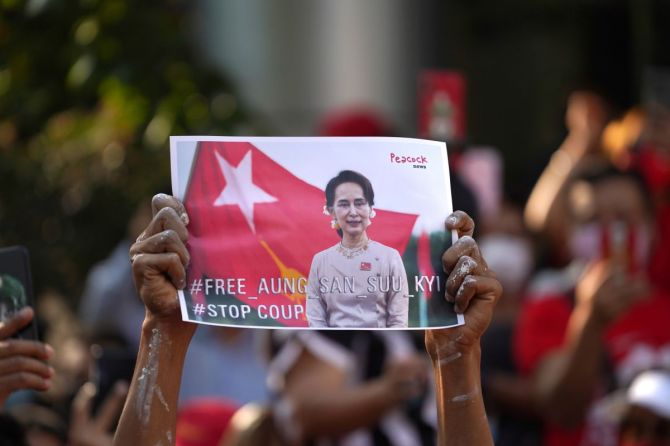
"Aung San Suu Kyi is very wedded to the idea of the rule of law and whatever she has done to reform the constitution, she has worked within the ambit of the 2008 constitution."
"Secondly, don't forget, she is General Aung San's daughter who was the founder of the Burmese army."
"On the Rohingya issue she is completely with popular public opinion in Myanmar. On all these points, she's on the same ground as with the military," Gautam Mukhopadhaya, India's former ambassador to Myanmar, tells Rediff.com's Archana Masih.
Did the military coup in Myanmar take you by surprise?
I was surprised by the final act because although the signals were threatening, it was thought that the military were not likely to go through with it.
But tensions between the military and the NLD government [Aung San Suu Kyi's National League for Democracy] have been brewing since 2015 and were never smooth. The signs were already there to see.
There were reports on Sunday that the crisis had blown over. What could have led to the sudden coup?
Essentially, the coup has taken place over what can simply be called an 'electoral dispute'. Of course, the armed forces have been pushing for some kind of mechanism and method to resolve this dispute.
It now seems as though the closed door and behind the scenes talks have not resulted in what the military wanted.
It probably gave them an excuse because they have never been entirely happy with the NLD government and civilian rule as a whole.
Particularly with two overwhelming victories by the NLD in 2015 and 2020, the military probably fears getting marginalised in Myanmar politics over time.
Hence, this was a good opportunity to reassert themselves as a political force. The electoral dispute was not a good enough reason to call an emergency, but they have used that as a reason to do so.
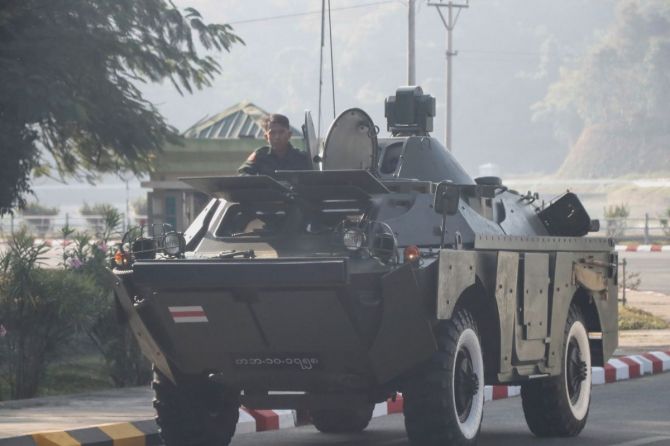
What does it mean for the future of the country?
That is speculative. So far, if you go by their statements, they say this emergency is temporary and could last a year.
I guess, they would probably like a return to some kind of USDP-led government [USDP is a political partuy backed by the military] which means a civilian government, but with a behind the scenes role for the military.
I think the 2008 constitution was designed for that. It was a kind of Indonesian style transition where the military steps back and the civilian government comes in front, where the limits are more or less set by the armed forces.
Of course, the system has evolved a lot in Indonesia over the years, but that is probably what the Myanmar military is looking at.
One doesn't know whether that is feasible and will happen because they have misjudged the situation more than once. I am not sure if their expectation matches with what the people want.
Also because General Min Aung Hlaing nurtured a desire to become president of the country after his retirement from the army?
His desire to be president is linked with the military's desire to remain relevant and not be marginalised. There may be some personal ambition, but I think there's also a corporate interest.
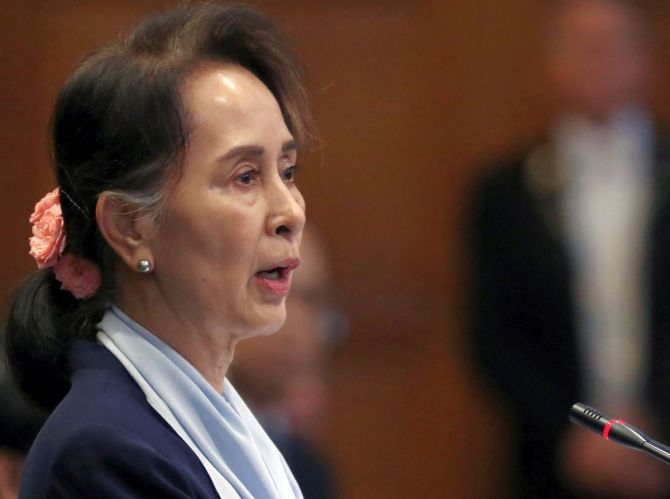
Have you met the general? What is he like?
I have met him several times. He is very much a military man. He is very blunt, to the point, no nonsense and disciplined. He clearly knows his mind and knows what he wants to do.
I think he is very moulded by the Myanmar military tradition which believes that they represent the best interests of the country.
The military believes that the foremost interests of the country are security, particularly, threats to its unity and integrity.
It is a very much a security and order view of the world.
In your view, why did the relations between Aung San Suu Kyi and the general deteriorate to such an extent that they haven't spoken to each other for a few years?
The 2008 constitution was not designed for the NLD to come into power. It was designed to prevent them from doing so. It was designed more or less to continue military rule from the background. That contradiction has existed right from the beginning.
During the elections in 2015, Aung San Suu Kyi pushed for certain constitutional reforms, including the right to be Myanmar's president. In fact, she did two things:
One, she made overtures to the military for a dialogue, but also used the constitution to try and push for that politically. She also garnered some degree of popular mobilisation, not street mobilisation, but generally through other forms.
Even at that time they could not strike up any rapport at all. People often call it 'democratic transition', but I basically see it as two forms of power -- power based on people and power based on the coercive apparatus.
The military distrusts people power. They think it will lead to instability and disorder. That is ingrained and that feeling is very strong, and that's the root of the problem.
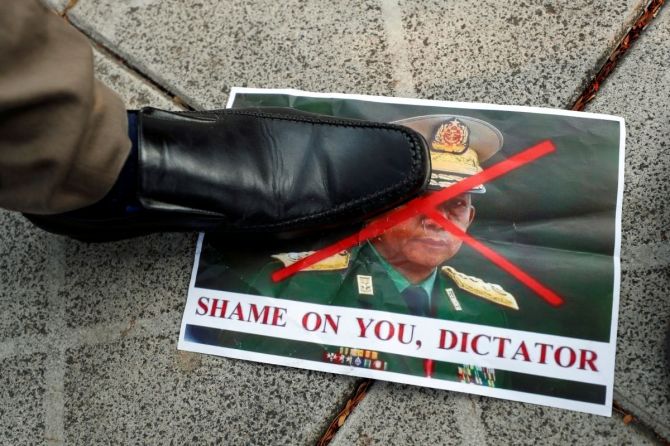
Aung San Suu Kyi has lost much of her sheen for failing to defend the Rohingya minority. Will this be an impediment in the world's reaction to her detention and support for the country this time around?
I think democracy has taken some twists and turns and the US itself has undergone its brush with right wing authoritarian tendencies.
For the US, this is the first test and they are bound to respond firmly, but the fact is that the US credibility has also been dented and US power has been relatively tempered by the rise of China.
I don't think the world's reactions will be as sharp, but they will be pro-democracy.
The international community will demand a restoration to democracy, but their ability to influence will be even less than in the past because Myanmar was trying to rehabilitate itself at that time and was economically extremely poor.
Now, the fact is that several countries are willing to continue their engagement for various reasons, rather than impose sanctions.
I don't think the military will feel that much pressure this time.
The US has threatened sanctions if Myanmar does not return to democracy.
The US will do that, but the fact is that the US has a very limited economic relationship with Myanmar. If the US is able to prevail upon Japan to do so, then yes, that could hurt Myanmar.
The US can withdraw aid, but a country's economy doesn't depend on aid and that applies to Myanmar too. They will pull through as they did before.
But this time, ASEAN, Japan and others won't break off relations and many countries, including India, will probably work behind the scenes to try and restore the status quo.
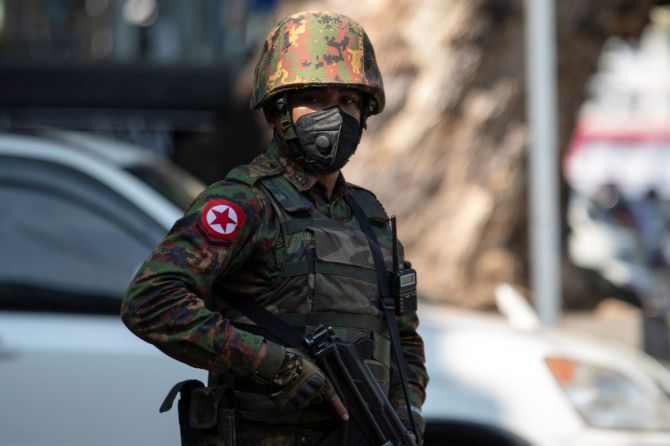
Aung San Suu Kyi generally went with the military and did not want to upset the applecart, even at the cost of her own international reputation. Why then did things go badly between her and the military junta?
Firstly, she is not a revolutionary. Though she has the popularity to do that, she has never advocated people taking to the streets and calling for a revolution, so far at least and I don't know if that will change now.
In 1988, she was not the leader. It was a basically a student's demonstration that became a popular agitation and she became the face of that agitation.
On the whole, she's very wedded to the idea of the rule of law and whatever she has done to reform the constitution, she has worked within the ambit of 2008 constitution.
Secondly, don't forget, she is General Aung San's daughter who was the founder of the Burmese army. I think she would always like to carry that legacy because the army is seen as a symbol of national strength.
On the Rohingya issue she is completely with popular public opinion in Myanmar, in particular, the Bamar majority. So, on all these three points, she's basically on the same ground.
And last of all, there is a very strong sentiment against international pressure and threats in Myanmar. In a way, by going to the International Court of Justice, she became the symbol of Myanmar resistance to international pressures.
On all these points, she is on the same ground as with the military, and to a great extent also public opinion.
One of the main reasons why she came back with an even stronger majority, was precisely because she stood up to the West and stood behind Myanmar public opinion.
Feature Presentation: Aslam Hunani/Rediff.com








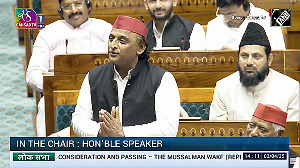


 © 2025
© 2025